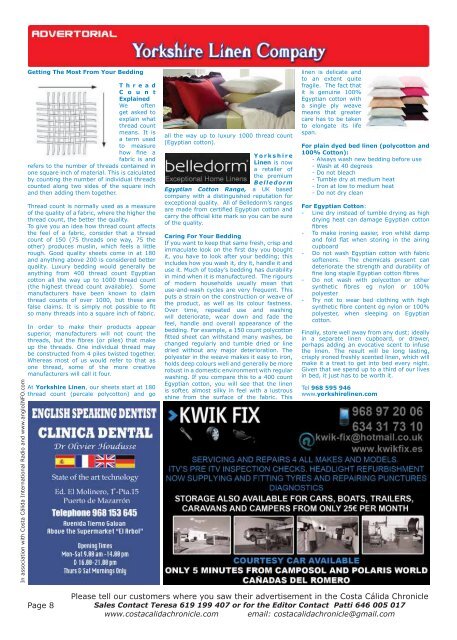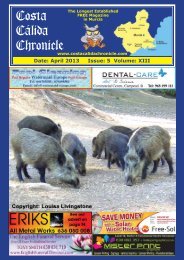June 2013 - Costa Calida Chronicle
June 2013 - Costa Calida Chronicle
June 2013 - Costa Calida Chronicle
You also want an ePaper? Increase the reach of your titles
YUMPU automatically turns print PDFs into web optimized ePapers that Google loves.
In association with <strong>Costa</strong> Cálida International Radio and www.angloINFO.com<br />
Getting The Most From Your Bedding<br />
T h r e a d<br />
C o u n t<br />
Explained<br />
We often<br />
get asked to<br />
explain what<br />
thread count<br />
means. It is<br />
a term used<br />
to measure<br />
how fine a<br />
fabric is and<br />
refers to the number of threads contained in<br />
one square inch of material. This is calculated<br />
by counting the number of individual threads<br />
counted along two sides of the square inch<br />
and then adding them together.<br />
Thread count is normally used as a measure<br />
of the quality of a fabric, where the higher the<br />
thread count, the better the quality.<br />
To give you an idea how thread count affects<br />
the feel of a fabric, consider that a thread<br />
count of 150 (75 threads one way, 75 the<br />
other) produces muslin, which feels a little<br />
rough. Good quality sheets come in at 180<br />
and anything above 200 is considered better<br />
quality. Luxury bedding would generally be<br />
anything from 400 thread count Egyptian<br />
cotton all the way up to 1000 thread count<br />
(the highest thread count available). Some<br />
manufacturers have been known to claim<br />
thread counts of over 1000, but these are<br />
false claims. It is simply not possible to fit<br />
so many threads into a square inch of fabric.<br />
In order to make their products appear<br />
superior, manufacturers will not count the<br />
threads, but the fibres (or piles) that make<br />
up the threads. One individual thread may<br />
be constructed from 4 piles twisted together.<br />
Whereas most of us would refer to that as<br />
one thread, some of the more creative<br />
manufacturers will call it four.<br />
At Yorkshire Linen, our sheets start at 180<br />
thread count (percale polycotton) and go<br />
all the way up to luxury 1000 thread count<br />
(Egyptian cotton).<br />
Yorkshire<br />
Linen is now<br />
a retailer of<br />
the premium<br />
Belledorm<br />
Egyptian Cotton Range, a UK based<br />
company with a distinguished reputation for<br />
exceptional quality. All of Belledorm’s ranges<br />
are made from certified Egyptian cotton and<br />
carry the official kite mark so you can be sure<br />
of the quality.<br />
Caring For Your Bedding<br />
If you want to keep that same fresh, crisp and<br />
immaculate look on the first day you bought<br />
it, you have to look after your bedding; this<br />
includes how you wash it, dry it, handle it and<br />
use it. Much of today’s bedding has durability<br />
in mind when it is manufactured. The rigours<br />
of modern households usually mean that<br />
use-and-wash cycles are very frequent. This<br />
puts a strain on the construction or weave of<br />
the product, as well as its colour fastness.<br />
Over time, repeated use and washing<br />
will deteriorate, wear down and fade the<br />
feel, handle and overall appearance of the<br />
bedding. For example, a 150 count polycotton<br />
fitted sheet can withstand many washes, be<br />
changed regularly and tumble dried or line<br />
dried without any major deterioration. The<br />
polyester in the weave makes it easy to iron,<br />
holds deep colours well and generally be more<br />
robust in a domestic environment with regular<br />
washing. If you compare this to a 400 count<br />
Egyptian cotton, you will see that the linen<br />
is softer, almost silky in feel with a lustrous<br />
shine from the surface of the fabric. This<br />
linen is delicate and<br />
to an extent quite<br />
fragile. The fact that<br />
it is genuine 100%<br />
Egyptian cotton with<br />
a single ply weave<br />
means that greater<br />
care has to be taken<br />
to elongate its life<br />
span.<br />
For plain dyed bed linen (polycotton and<br />
100% Cotton):<br />
- Always wash new bedding before use<br />
- Wash at 40 degrees<br />
- Do not bleach<br />
- Tumble dry at medium heat<br />
- Iron at low to medium heat<br />
- Do not dry clean<br />
For Egyptian Cotton:<br />
- Line dry instead of tumble drying as high<br />
drying heat can damage Egyptian cotton<br />
fibres<br />
- To make ironing easier, iron whilst damp<br />
and fold flat when storing in the airing<br />
cupboard<br />
- Do not wash Egyptian cotton with fabric<br />
softeners. The chemicals present can<br />
deteriorate the strength and durability of<br />
fine long staple Egyptian cotton fibres<br />
- Do not wash with polycotton or other<br />
synthetic fibres eg nylon or 100%<br />
polyester<br />
- Try not to wear bed clothing with high<br />
synthetic fibre content eg nylon or 100%<br />
polyester, when sleeping on Egyptian<br />
cotton.<br />
Finally, store well away from any dust; ideally<br />
in a separate linen cupboard, or drawer,<br />
perhaps adding an evocative scent to infuse<br />
the linen. The result will be long lasting,<br />
crisply ironed freshly scented linen, which will<br />
make it a treat to get into bed every night.<br />
Given that we spend up to a third of our lives<br />
in bed, it just has to be worth it.<br />
Tel 968 595 946<br />
www.yorkshirelinen.com<br />
Page 8<br />
Please tell our customers where you saw their advertisement in the <strong>Costa</strong> Cálida <strong>Chronicle</strong><br />
Sales Contact Teresa 619 199 407 or for the Editor Contact Patti 646 005 017<br />
www.costacalidachronicle.com email: costacalidachronicle@gmail.com
















